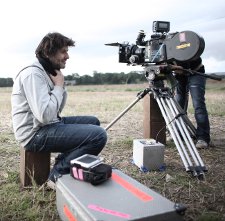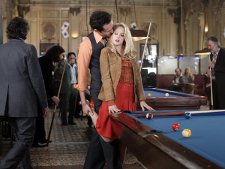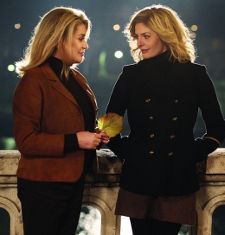
Christophe and his camera. Photo courtesy: French Film Festival
 |
| Christophe Honoré with Anne-Katrin Titze: "I like to complicate things and have the spectators do some work with me." Photo: Charlie Olsky |
Eye For Film caught up with French film director Christophe Honoré as his latest film, Beloved was due to open at New York's IFC Center and Lincoln Plaza Cinema.
Anne-Katrin TitzeMy first question was about Jacques Demy looming large in his work, via small asides, such as a family that only has daughters (a quote from Demy’s Umbrellas Of Cherbourg) or cheerful incest songs (as in Demy’s Once Upon A Time) are reminiscent of the late master of the French musical.
Christophe Honoré: My relation with Jacques Demy starts at the beginning. I come from Brittany, from a very small village. I dreamt of the cinema at 14. My grandmother lived in Nantes and I discovered Lola, Jacques Demy’s movie there. Of course, my family and everybody said, how can you dream of making movies – of course I knew nobody in cinema. And for me, when I discovered Jacques Demy and learned that he came from Nantes, I wondered: Okay – if this man can have success as a filmmaker, why not me? Later he became my favourite director. I never tried to imitate him.
Beloved is different. Catherine Deneuve and Chiara Mastroianni are very important and I utilise the songs in a different way.
AKT: How would you describe your use of the songs?
CH: For me it is really a reflection on modernity to use song to break the illusion of reality for the audience. I know – and like – that for a lot of spectators, the songs are the bad moments of my movie. Because they like the story and the songs break up the story and their belief in the story.
AKT: Almost Brechtian?
CH: Yes, yes. I like to complicate things and have the spectators do some work with me.

AKT: You push very far with the topics of the songs. For example, the scene at the billiard table has Jaromil (Rasha Bukvic/Milos Forman) fantasise about his own daughter. He hasn’t seen her in many years and she is a young teenager now – dangerous territory for a song and dance number. I noticed the discomfort in the audience at the press screening.
CH: I like that. I don’t want the audience feel all cute. I am sure, Jacques Demy tried to invent a new, and typically French idea of the Broadway musical. Demy for me is like a lonely planet in the cinema. A galaxy – so it is impossible to share a planet with him.
AKT: What about the Hollywood musical? I was reminded of a dance number from Funny Face.
CH: I am surprised when you say that I share something of the American tradition. Of course, I love Minnelli, Cukor, Stanley Donen, but I never thought of their movies when I made this one.
AKT: I was thinking of a specific scene. Chiara’s character Vera is in the club in London, starts to dance, and is being lifted up, like Audrey Hepburn in Funny Face (and Louis Garrel plays the jealous Fred Astaire part). She wears black pants and a shirt with Oscar Wilde on it.
CH: You are right. Yes, I was discussing it with the costume designer (Pascaline Chavane). It was Audrey Hepburn. Also with the production designer (Samuel Deshors). We had a picture of Hepburn with her leg all the way up under the archway in the vault. You are right, we did use it as aesthetic reference a little bit.
AKT: A big theme of your film, one you explore in an unusual way, is shame. Without stabbing your characters in the back, you are exposing levels of shame, a whole carpet of shameful behaviours rarely seen in the cinema.
CH: These are characters that habitually expose themselves to shame. But, in fact, they refuse to be shamed. Especially the character of Madeleine. I believe she refuses shame. She is an outsider, even when she prostitutes herself at the start or abandons her husband in Prague. She is truly a person who morally never judges herself.
AKT: What about her daughter?
CH: Oh, the daughter is different.

AKT: What I meant was, does the mother judge her daughter? I am thinking of the scene of the evening of September 11. In voice-over, you have the mother comment, taking on the perspective of the strangers, who cannot comprehend a woman dancing on the night of this monumental event.
CH: My idea was that for the people assembled, it was completely insane and shameful to see that woman dancing there. But we, the spectators, know that it is not a dance of joy but a dance of complete despair. It is the last moment of her accord to be in life. The song reminds her of her adolescence and she is oblivious of the context. In the same way, Madeleine forgets the context in Prague. And I am sure that in our own life, even a day like September 11, we remember something selfish. That’s where shame comes in again and selfishness.
AKT: Where were you on September 11?
CH: It was strange. I was working on my first feature film. We were in a cemetery to find a place to shoot. We had been in lots of cemeteries in France. Suddenly, one guy from the crew told us there was an attack on New York and, of course, at that time we knew nothing. So we continued to inspect the different cemeteries. Of course, that night when you came back, you heard what happened. This was France, it must have been different in New York, of course.
AKT: Even in New York there was a huge difference between Uptown and Downtown. It’s very difficult to generalise for that day and the following ones.
CH: The idea of tragedy comes with time. Nobody feels the tragedy as it happens. A day or two later, yes. As humans we are incapable to have the sense of tragedy at the moment the tragedy takes place.
AKT: You show that well in the scene when the Russian tanks roll into Prague…
CH: And all she thinks about is her husband and his affair. And even in the movie I didn’t want to show more. You see the tanks and her race to her husband. Afterwards she realises that was an important day.
AKT: Can you tell me about your work with the costume designer? Your film spans from the Sixties to almost the present.
 |
| Milos Forman, Catherine Deneuve and Chiara Mastroianni in Beloved |
CH: It was completely new for me. Before, my movies always took place now, in the present, without the historical obligation. It was complicated. The thing you have to avoid is the feel of “vintage”. To show the Sixties you have to avoid today’s idea of the Sixties. To make it real we tried mixing in things from the Fifties and other decades. It is like a house where there is furniture from every decade. And then of course we tried to build a bridge from Madeleine young and Madeleine old, between the two actresses playing her, Ludivine Sagnier and Catherine Deneuve. We tried to work on the materials and the colors.
AKT: Let’s talk about the opening at the shoe shop. You go full force into a Sixties mood with the French version of These Boots Are Made For Walking and a banquet of beautiful Roger Vivier pumps.
CH: The opening is like a preamble, or like a glass of Champagne. I wanted the opening to be very happy and a surface thing, and then people go deeper and deeper and deeper into the movie. So I decided to go with Roger Vivier shoes right after Catherine Deneuve said yes to participate in the movie. In fact, the connection is like this. The Roger Vivier company was created in the sixties and they became famous because of Catherine Deneuve, who wore these shoes in Belle De Jour by Buñuel.
AKT: And the clothes by Yves Saint Laurent. There is a great scene at the start of your film. You show a woman who sees herself as a flâneur, enjoying her stolen luxury shoes and how quickly our perceptions can change from watching her walking the streets to street walker. Flâneuse or fallen woman, both and neither?
 |
| Beloved poster |
CH: Precisely. Roger Vivier, the brand is very much associated with the actress. So I found it funny to imagine Catherine Deneuve stealing Roger Vivier shoes, and have her imagine that with these shoes she is a lady. And in fact the first man she comes across, who sees her in these shoes, thinks she is a prostitute.
AKT: Decades later, at the end of the film, Madeleine abandons the fateful shoes on the street, placed one neatly next to the other. It made me think of Jacques Derrida, who pointed out the huge difference between a pair of shoes and an individual one. He was talking about representation in painting, about utility and fetishising. No single Cinderella slipper in your film.
CH: I see what you mean. It is a way to express that our times are not times of fairy tale. There’s something like the end of illusion – the illusion of the Sixties that everything will be better tomorrow. My mother’s generation in the Sixties with the sexual revolution, the pill, the emancipation of women, gay rights, believed in progress. I am not sure this is the case with women of my generation, this belief in the future.
I made the decision to have Chiara’s character fall in love with a homosexual man (played by Paul Schneider) to express her belief that maybe enough progress has been made to abandon these categories as such. That maybe one doesn’t have to ask that question any more and love everybody. Ultimately, reality falls on her head.





















